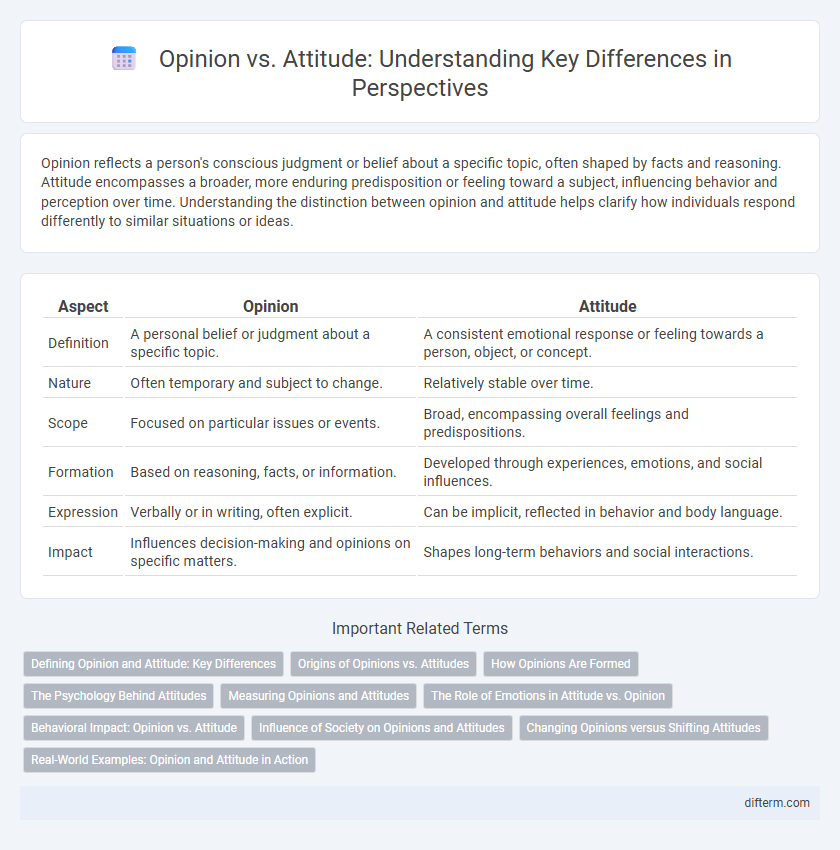Opinion reflects a person's conscious judgment or belief about a specific topic, often shaped by facts and reasoning. Attitude encompasses a broader, more enduring predisposition or feeling toward a subject, influencing behavior and perception over time. Understanding the distinction between opinion and attitude helps clarify how individuals respond differently to similar situations or ideas.
Table of Comparison
| Aspect | Opinion | Attitude |
|---|---|---|
| Definition | A personal belief or judgment about a specific topic. | A consistent emotional response or feeling towards a person, object, or concept. |
| Nature | Often temporary and subject to change. | Relatively stable over time. |
| Scope | Focused on particular issues or events. | Broad, encompassing overall feelings and predispositions. |
| Formation | Based on reasoning, facts, or information. | Developed through experiences, emotions, and social influences. |
| Expression | Verbally or in writing, often explicit. | Can be implicit, reflected in behavior and body language. |
| Impact | Influences decision-making and opinions on specific matters. | Shapes long-term behaviors and social interactions. |
Defining Opinion and Attitude: Key Differences
Opinion reflects an individual's specific beliefs or judgments about particular topics, often expressed verbally or in writing, while attitude encompasses a broader, enduring predisposition toward people, objects, or ideas, influencing behavior and emotional responses. Opinions are typically more fluid and subject to change with new information, whereas attitudes are relatively stable and deeply rooted in personal experiences and values. Understanding these distinctions is crucial for analyzing human behavior and communication patterns effectively.
Origins of Opinions vs. Attitudes
Opinions stem from cognitive processes influenced by personal beliefs, experiences, and information acquisition, reflecting conscious evaluations. Attitudes originate from emotional responses and social conditioning, often forming subconsciously and guiding behavior. Understanding these origins clarifies that opinions are flexible judgments whereas attitudes represent deeper, more stable predispositions.
How Opinions Are Formed
Opinions are formed through a combination of personal experiences, social influences, and information processing, reflecting an individual's cognitive evaluation of specific issues. Unlike attitudes, which are broader and more stable predispositions toward objects or concepts, opinions are more flexible and can change with new evidence or persuasive arguments. Understanding the formation of opinions involves examining how people interpret facts, social cues, and emotional responses to construct their judgments.
The Psychology Behind Attitudes
Attitudes reflect deep-seated psychological patterns formed by beliefs, emotions, and behavioral intentions toward objects or ideas, shaping consistent responses in various contexts. Unlike opinions, which are often transient and subject to rational evaluation, attitudes are influenced by cognitive schemas and affective experiences that drive motivation and perception. Understanding the psychology behind attitudes reveals their role in guiding decision-making and social interaction beyond superficial opinion expression.
Measuring Opinions and Attitudes
Measuring opinions involves assessing specific beliefs or judgments about particular topics, often quantifiable through surveys or polls. Attitudes reflect deeper, enduring evaluations that influence behavior and are typically measured using scales like the Likert scale to capture intensity and direction. Differentiating between opinions and attitudes enables more precise analysis in social research, allowing for targeted interventions based on transient perspectives versus stable predispositions.
The Role of Emotions in Attitude vs. Opinion
Emotions play a crucial role in shaping attitudes by providing a deep, affective foundation that often leads to consistent behavioral patterns. Opinions, in contrast, are more cognitive and evaluative, reflecting beliefs or judgments that may shift with new information. Understanding the emotional underpinnings of attitudes reveals why they tend to be more stable and resistant to change compared to opinions.
Behavioral Impact: Opinion vs. Attitude
Opinions represent individual beliefs or judgments about specific topics, often formed through information processing, while attitudes encompass deeper, enduring evaluations that influence consistent behavioral responses. Attitudes drive long-term behavioral tendencies by shaping emotional and cognitive frameworks, whereas opinions may lead to more immediate but temporary actions. Understanding the distinction is crucial in predicting how public sentiments translate into consumer behavior and social movements.
Influence of Society on Opinions and Attitudes
Society plays a crucial role in shaping both opinions and attitudes through cultural norms, social interactions, and prevailing values. Opinions tend to be more flexible and can change rapidly based on new information or social influence, while attitudes are deeper, more enduring evaluations influenced by long-term socialization processes. The continuous feedback from social networks, media, and community groups reinforces attitudes and can simultaneously shift opinions within a societal context.
Changing Opinions versus Shifting Attitudes
Changing opinions involves modifying specific beliefs or judgments based on new information or evidence, often resulting in a temporary or situation-specific adjustment. Shifting attitudes reflects a deeper, more enduring transformation in one's overall evaluation or emotional disposition toward a subject, influencing behavior and perceptions over time. Understanding this distinction is crucial for effective communication strategies aiming to foster long-term acceptance rather than mere agreement.
Real-World Examples: Opinion and Attitude in Action
Opinions often reflect specific beliefs about policies or events, such as public support for climate change initiatives, while attitudes encompass broader emotional and evaluative responses, like long-term environmental concern influencing lifestyle choices. For instance, a voter may hold a positive opinion about a candidate's stance on healthcare but exhibit an overall negative attitude toward political institutions due to distrust. Understanding this distinction aids in interpreting survey data accurately and crafting targeted communication strategies that address both cognitive judgments and affective predispositions.
opinion vs attitude Infographic

 difterm.com
difterm.com